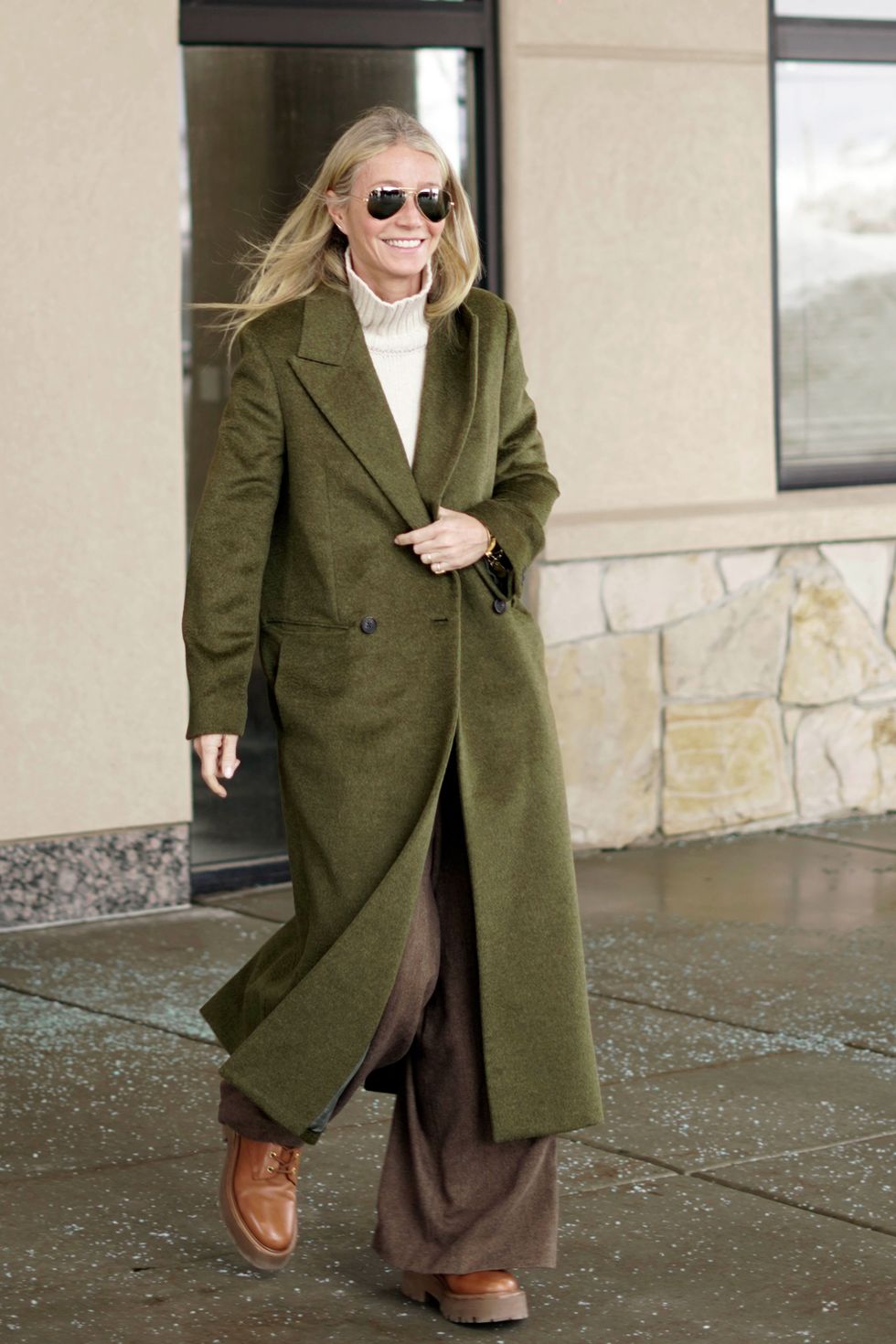Do We Want to Eat the Rich, or Dress Like Them?
Style Points is a weekly column about how fashion intersects with the wider world.
This summer, it seems, everyone wants to be rich. We’re idolizing the “stealth wealth” of the characters on Succession, following the fashion statements from Gwyneth Paltrow’s ski trial, aspiring to emulate so-called “old money” style (a designation so malleable, it’s recently been used to describe the fashion sense of both Sofia Richie and Kylie Jenner), and craving the “coastal grandmother” look, which seems to come with both beachfront property and a hefty retirement fund. Tennis, golf, and ski style are at their sartorial peaks, respectively, as though fashion is on a permanent summer Friday.
At the same time, economic uncertainty prevails, the Writers Guild of America (WGA) is on strike, millennials and Gen Z are rejecting always-on hustle culture, corporate officewear is officially camp, labor activists are style icons, and “eat the rich” is being bandied about even more than it was in the Occupy Wall Street years. Polling has shown that Gen Z adults favor socialism over capitalism. Even orcas want to eat the rich—or at least scuttle their yachts.
It’s never been less cool to be part of the one percent. But, somehow, the public is more enamored than ever with dressing like them. What cognitive dissonance is gripping fashion right now? Do we want to be accessorizing with pearls, or pitchforks?
It seems we’ve traded one unrealistic fantasy—hustle culture—for another, namely, an inherited life of leisure. The current longing seems to be for “conspicuous consumption that’s somehow not tacky,” says Sarah Jaffe, the author of Work Won’t Love You Back. She sums up the appeal of the coastal grandmother as “effortless wealth that comes from asset ownership.” The same seductive fantasy could apply to stealth wealth, quiet luxury, old money, and preppy style—slippery, not-quite-synonymous terms that have one thing in common: they reify both subtlety and ease.
“Americans have a unique relationship with class and dress, and it goes back as far as we’ve been a nation, which is arguably not that long,” says Avery Trufelman, the creator and host of the podcast Articles of Interest, which delves into the meaning behind our clothing and has devoted recent episodes to everything from pointe shoes to prison uniforms. “Nominally, we’re supposed to live in a classless society.” Unlike other countries, “we never had sartorial codes or laws about who can wear what. And, in fact, a hallmark of American democracy was this democracy of goods—this idea that anyone can buy anything they want.” And, by association, become anything they want.
Trufelman’s “American Ivy” season of the podcast looks at prep’s longstanding grip on our collective imagination. In one episode, she explores the rise of mass-produced clothing in America, which, she tells me, was “this powerful publicity move for this experiment known as democracy. People would come over from Europe and be like, ‘Every single person dresses so well.’ The president wore ready-made suits, and so did the con man.”
But buried under the cool egalitarianism, there have always been fault lines. Trufelman explains the paradox with an anecdote: she once worked at a big media organization where everyone sat in identical cubicles. “I could never find my boss because they were like, ‘We don’t believe in corner offices. Your boss is there with the people.’ It didn’t mean I didn’t have a boss; it just meant that she was hidden and we were pretending it was a democracy. And that’s American dressing. We’re pretending it’s a democracy.”
Some form of stealth wealth has existed since the country was founded, Trufelman argues. She cites a passage in Edith Wharton’s The Age of Innocence where two characters discuss the unspoken rule that you must set aside your Paris-made dresses for a season before wearing them out, since showing off new clothes would be considered gauche.
Stealth wealth around the time of the 2008 recession denoted a form of self-protection. Luxury customers carried their purchases in unmarked brown paper bags and opted for quiet minimalist brands over flashy logos; Wall Street employees heading into the office doffed their suits in favor of casual wear, lest they incur the wrath of the masses at Zuccotti Park. At the time, it was a style directive for the rich, one that came from fear of standing out and becoming a target. Now, it’s directed at the rest of us, a shortcut to help us game the ever-changing system of fashion.
Now that wealth is, as Jaffe says, “more inaccessible than ever” for most, “people have started realizing that work doesn’t pay.” She sums up the mood as: “I’ve still got to hustle for everything. And it’s never going to shake out unless somehow I have access to family money.” Old money style offers a fantasy of permanence in a world where more and more things are disposable, temporary, or just off-limits. Even the fascination with coastal grandmother figures like Martha Stewart and Ina Garten feels like “an admission of the fact that we’re never going to be able to retire.”
But are old money and its stuffy relatives actually something we want to aspire to in 2023? Preppy style, for instance, can be worn by anyone and infinitely recontextualized, but it draws from white, wealthy, and somewhat moribund aesthetics. And yet it’s as relevant as ever in the culture. No one is more surprised by this development than Trufelman. “American Ivy” came about because she was researching an idea for a season about trends, but kept hearing from trend forecasters that preppy style was coming back. “And I was like, ‘Really? After 2020, we’re really going to try to dress like these fuckers?’”
As she dug deeper, she started to see the appeal. In a society in which many people can, increasingly, dress however they want, “We say there are no rules, but there are obviously rules. We’re hungry for rules,” she says. “That’s why the Preppy Handbook,” the 1980 bestseller that laid out the as-yet-unwritten rules of the style, “was such a rip-roaring success.”
Hot girls may not gatekeep, but preppies, and other practitioners of old-money style, definitely do. In fact, Trufelman thinks “the fact that these codes have managed to elude the internet” is a big part of their appeal. Amid TikTok’s takeover of fashion, creators are ready to crack them right open with explainer videos of the “Hey guys, just popping on to tell you the fashion secret rich people don’t want you to know about” variety. Trufelman gives a luxe Loro Piana knit as an example. “You can’t tell what it’s made of from an image, [only] if you’re there and you can touch it. It’s this knowledge that has managed to circumvent all of the democratic channels, so of course people are hungry for it.” This kind of fashion, she says “has to be explained. It has to be story-fied. Not just, ‘Look at my beautiful thing,’ but, ‘It’s beautiful and here’s why.’ People are so much more curious about a little backstory.”
While the hashtag might thrive on your “For You” page (#oldmoneyaesthetic has nearly 3 billion views) old money also has a distinctly analog mystique. “I wonder if old money means not tech, not Mark Zuckerberg,” Trufelman says. The time when we wanted to look like fully optimized tech bros or girlbosses is definitively over. While our sleek, direct-to-consumer style once glorified both the grind and the future, fashion has gone back to a more leisurely, retro ideal where try-hards are definitely not welcome.
Trufelman took away from “American Ivy” the wisdom that “when the fashion cycle speeds up, you have to rely on nostalgia…to sit and take long walks and gestate and come up with a totally new shape? That is incredibly hard to do. And you can’t do that when you’re showing collections [multiple] times a year. So I think there’s an economic imperative to just recycle shit.”
She also found from her conversations that preppy is “the thing that’s most legible to the consumer. And it’s part of why, for the mass market, preppy is always a safe bet, because you know exactly what it’s going to mean. I always group preppy and cowboy in the same category, in that it’s a lifestyle, a legend. It’s cohesive. You see something with fringe: that’s a cowboy. You see a cable-knit sweater: that’s preppy.
“In a weird way, they’re two sides of the same coin. Preppy is coastal institutional, cowboy is prairie individual. And when you put them both together, people go fucking nuts,” she says, pointing to the work of designers from Ralph Lauren to Bode. “Those archetypes will never go out of style. And also, it’s not appropriation to wear either of them; anyone can wear them….Preppy is among the styles that will always make sense.”
There’s another, rosier way to look at the dissonance between our disenchantment with capitalism and our enchantment with capitalist fashion. Call it a more finely-honed variety of champagne socialism: the demand that life’s little luxuries be equally distributed. Jaffe quotes Stacy Davis Gates, president of the Chicago Teachers Union, who recently ended an interview by repeating, “We deserve nice things.”
“It gave me chills,” Jaffe says. “We know we deserve nice things, but the only way we can imagine having those nice things is having been born rich.”
Says Trufelman, “There is this un-yoking between pleasure and capital: the idea that luxury should be for everyone, and it shouldn’t be a sign of hard work. In an American context, obviously, that’s super retrograde, because we only know one way to live that way, which is to be born with it. But maybe,” she adds, “this is a new sort of galaxy-brain optimism, where we can all climb all the way up to the silly part of Maslow’s hierarchy.”

ELLE Fashion Features Director
Véronique Hyland is ELLE’s Fashion Features Director and the author of the book Dress Code, which was selected as one of The New Yorker’s Best Books of the Year. Her writing has previously appeared in The New York Times Magazine, The New Yorker, W, New York magazine, Harper’s Bazaar, and Condé Nast Traveler.







